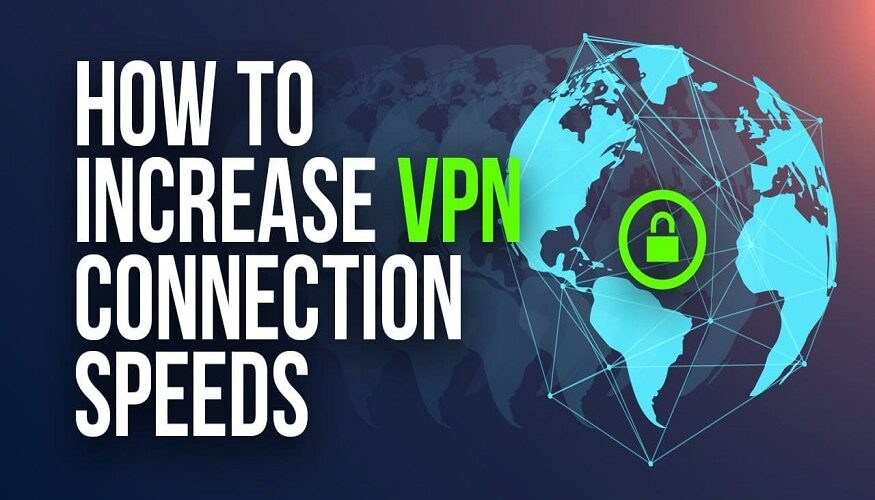There are few things more infuriating than waiting for web pages to load. Considering how many individuals open many tabs simultaneously, use the internet for business, or download multiple files, a poor internet connection might complicate someone’s life.
Individuals who use VPNs occasionally question if the VPN they are using is causing their internet connection to slow down. The answer to this question is that it is dependent on the VPN service you are using. A good VPN will slow your connection by a minimal amount that you will not notice. Interestingly, a decent VPN can occasionally boost the speed of your relationship. All of these points will be discussed in greater detail below.
What Effect Does Using A VPN Have On Internet Speed?
VPN’s function bypasses your traffic via their servers and acts as a “go-between” for you and the websites you visit. This, paired with a high level of encryption, enables VPNs to maintain your anonymity, safeguard your data, and perform all of the other functions that make VPNs so popular.
Three significant elements influence how VPNs affect your internet speed, and they are as follows:
- Distance to server Encryption quality Server load
- Distinction from A Server
Perhaps the most critical factor affecting how a VPN affects your internet speed is the server’s geographic location to which you connect. As a rule, the closer the server is to your website, the faster the internet connection. This is because your internet traffic travels a shorter distance than other types of traffic. Therefore, you should ideally choose servers located close to your city or nation.
Encryption Quality
VPNs encrypt your data, keeping it safe from hackers and online retailers. The encryption’s quality may also affect your internet speed. VPNs that use the maximum level of encryption may have latencies, as encrypting and decrypting data takes time. However, if your internet connection is good, the lag should be minimal.
The server’s load
The quantity of users who connect to the server is critical. When a server has an excessive number of users, internet speed suffers. However, if you use a premium VPN Service such as SurfShark VPN, you will never encounter server overload. This is a common problem with free VPNs that connect multiple users to a few servers hoping that some users will upgrade to paid subscribers.
Premium VPNs link you automatically to servers that enhance your internet speed. Additionally, they are available on a variety of platforms. VPN on Mac is not the same as VPN on Windows. The same is true for other operating systems such as iOS, Android, and Linux.
Additionally, VPNs Can Accelerate Your Internet Connection
We’ve found that while VPNs may slow your internet connection, the effect should be insignificant if you use a high-quality VPN. However, there are instances where VPNs might accelerate your internet connection. One of these instances is when your internet service provider (ISP) targets you with bandwidth throttling.
Your ISP may slow down your internet connection at times of the day or for specific websites. This imposes a speed limit on your internet connection. In this case, good VPNs like iTOP VPN can act as knights in shining armor by routing your traffic through a virtual private network. As a result? You circumvent your ISP’s speed constraints.
VPNs can also help you improve your internet speed by rerouting your traffic through the fastest routes. Your Internet service provider may be unconcerned about providing you with the most effective Wi-Fi Router.
Tips to Boost Your Internet Speed
- If your internet connection is slow, there are some practical things you can take to speed it up. They are as follows:
- Your Modem or Router Must Be Restarted
- Occasionally, the solution to your internet speed troubles is as simple as restarting your modem or router, which may be functioning poorly due to memory leaks or other issues.
- Restarting your connection or router may be all that is required to restore proper operation. Keep in mind that you should avoid using VPN on both your router and device. It will simply serve to degrade your internet speed further. Utilize your VPN on your router or mobile device.
- Consider Connecting Via A Hardwired Connection
- Wireless networks are fantastic, but they can occasionally result in slow speeds when many devices are linked to a single network. Utilizing a connected connection may enable you to achieve quicker speeds.
Verify your VPN configuration.
Ascertain that you are employing a VPN that is well-known for its speed. It’s even better if the VPN includes additional security measures and other options for customizing your VPN speed. Experiment with various internet protocols, such as UDP and TCP. These options can significantly enhance your internet speed, depending on the situation.
Additionally, avoid free VPNs. While everyone enjoys freebies, free VPNs are more likely to slow down your internet connection. Additionally, they offer less stability and security. Additionally, your data is sold to advertising. After all, they must generate revenue in some way.
Conclusion
VPNs, or at least good VPNs, will not significantly slow down your connection in most circumstances. If the rate is low, the issue is almost certainly with your ISP, and a strong VPN can boost speed in this case. Utilize reliable VPNs to benefit from both speed and security. What more could you possibly want?

